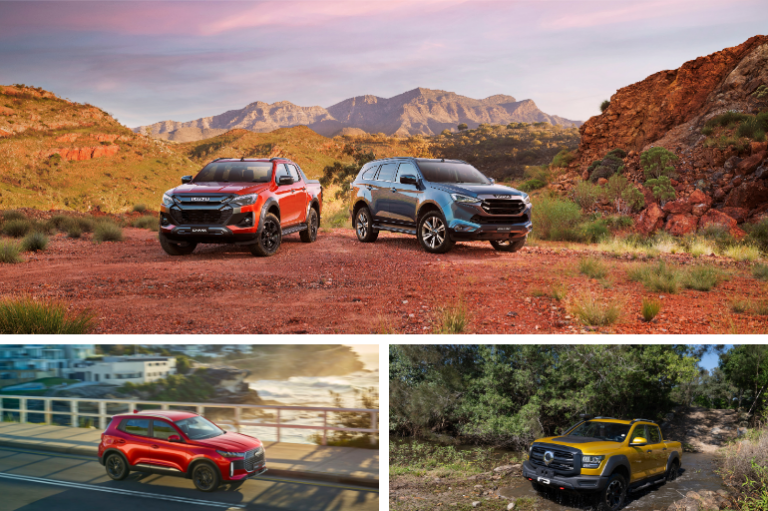2024 has proven to be a landmark year for the Australian automotive industry, with exceptional performances from leading brands Isuzu UTE, GWM, and Chery. These manufacturers achieved significant milestones, reinforcing their positions as key players in one of the world’s most competitive markets. Here’s how each brand contributed to last year’s success story.
Isuzu UTE: A Record Year with Sustained Growth
Isuzu UTE Australia (IUA) capped off an all-time record sales year in 2024, firmly establishing itself in the top 10 best-selling vehicle brands for the third consecutive year. Ranking 8th in the Federal Chamber of Automotive Industries (FCAI) charts, Isuzu UTE achieved a remarkable milestone with 48,172 vehicles sold, representing a 6.2% year-on-year increase.
The D-MAX ute remained a standout, securing its position as the 4th best-selling vehicle overall and 3rd in the competitive 1-tonne ute light commercial vehicle (LCV) segment. With 30,194 units delivered, the D-MAX’s continued popularity was bolstered by its mid-year facelift, incorporating customer-driven enhancements.
Meanwhile, the MU-X SUV achieved its own milestone, delivering a record 17,978 units. This represented a 27.2% year-on-year growth, reflecting a consistent rise in demand for the versatile seven-seater. The MU-X also ranked 2nd in the ‘SUV Large < $80K’ segment, capturing an impressive 14.4% market share.
Junta Matsui, Managing Director of Isuzu UTE Australia, highlighted the importance of customer feedback and loyalty in driving the brand’s success. “Reaching 48,000 Australian driveways in 2024 is a testament to our commitment to delivering world-class vehicles,” he stated. Isuzu UTE’s consistent performance underscores its growing presence in Australia, cemented by robust community partnerships and a focus on long-term sustainability.
GWM: Hybrid Power Drives Record Sales
GWM also celebrated a record-breaking year in 2024, achieving unprecedented sales figures and solidifying its position as a top 10 automotive brand in Australia. With 42,782 units sold, GWM marked a remarkable 17.5% year-on-year growth, the highest among the top 10 manufacturers.
Key to this success was the brand’s commitment to hybrid technology, which accounted for 28% of its total sales volume. GWM’s hybrid vehicle sales soared by 61% year-on-year, with 11,980 units delivered. The Haval Jolion hybrid emerged as a highlight, with a 43% increase in sales and a commanding 14.8% share of the small SUV market in December.
GWM’s success was further bolstered by an expanded dealer network, which grew by 113% over five years, enhancing customer accessibility and support. Steve Maciver, Head of Marketing & Communications at GWM, credited the brand’s growth to its investment in innovation and understanding of customer needs. “Our commitment to Australia is reflected in our expanding product range and dealer network, ensuring we exceed customer expectations,” he said.
Looking ahead, GWM plans to introduce new models such as the Haval H6GT PHEV and updated Cannon ute, positioning itself for continued growth in 2025. With its focus on affordability, eco-friendliness, and style, GWM is set to remain a significant player in Australia’s automotive market.
Chery: Rapid Expansion and Record Sales
Chery made waves in 2024 with record-breaking sales both globally and locally. The brand achieved an astounding 2.6 million global vehicle sales, reflecting a 38.4% year-on-year growth. In Australia, Chery’s performance was equally impressive, with 12,603 units sold—a staggering 158% increase compared to 2023. This achievement cements Chery’s status as Australia’s fastest-growing car company.
A significant contributor to Chery’s global success was its commitment to new energy vehicles (NEVs). The brand recorded 583,569 NEV sales, representing a remarkable 232.7% year-on-year growth. This included a milestone in December, with plug-in hybrid electric vehicle (PHEV) sales surpassing 100,000 units in a single month.
Chery also achieved major milestones in its global operations, such as the production of its 15 millionth vehicle and the establishment of its first joint venture plant in Europe. Locally, the brand’s strategic focus on innovation and customer-centricity drove its Australian sales to unprecedented heights.
Tim Krieger, Chery Australia’s General Manager, attributed the brand’s rapid growth to its commitment to delivering stylish, technologically advanced vehicles that meet diverse customer needs. “Chery’s record-breaking year reflects our relentless drive to provide world-class products,” he stated.
Key Trends and Industry Impact
The achievements of Isuzu UTE, GWM, and Chery highlight several key trends shaping the Australian automotive market in 2024:
- Shift Towards Sustainability: The growing popularity of hybrid and NEV models underscores the industry’s shift towards eco-friendly solutions. GWM and Chery’s emphasis on hybrid and electric vehicles reflects this trend, aligning with global efforts to reduce emissions.
- Customer-Centric Innovations: Across all three brands, customer feedback and preferences played a pivotal role in shaping product offerings. Isuzu’s D-MAX facelift and GWM’s expanded dealer network are prime examples of this approach.
- Market Resilience: Despite global economic challenges, the Australian automotive market demonstrated resilience, with total new vehicle sales reaching 1.221 million units in 2024, up 0.3% from the previous year.
- Diverse Offerings: The success of various vehicle segments—from utes and SUVs to NEVs—reflects the diverse preferences of Australian consumers. Brands that cater to this diversity, like Isuzu, GWM, and Chery, are well-positioned for sustained growth.
Looking Ahead
Despite the strong economic headwinds expected in 2025, the automotive industry continues to evolve, and Isuzu UTE, GWM, and Chery are poised to build on their 2024 successes. Their commitment to innovation, customer satisfaction, and sustainability ensures they remain at the forefront of Australia’s dynamic automotive landscape.
For fleet buyers , these achievements translate into greater choice, advanced technology, and improved access to eco-friendly transportation options. With






